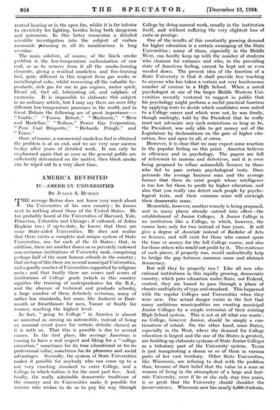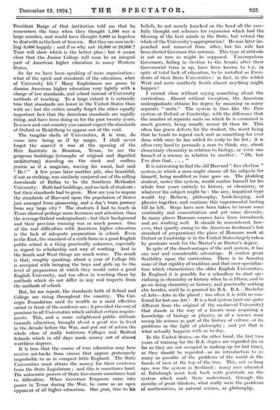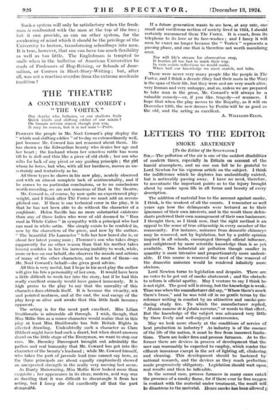AMERICA REVISITED
IV—AMERICAN -UNIVERSITIES
BY JULIAN S. HUXLEY
THE average Briton does not know very much about the Universities of his own country ; he knows next to nothing about those of the United States. He has probably heard of the Universities of Harvard, Yale, Princeton, Columbia and Chicago ; if cultured, of Johns Hopkins too ; if up-to-date, he knows that there are some State-aided Universities. He does not realize that there exists a complete and unique system of State Universities, one for each of the 48 States : that, in addition, there are another dozen or so privately'endowed non-sectarian institutions of University rank, comprising perhaps half of the most famous schools in the country ; that on top of this there are several municipal Universities, and a goodly number of Universities supported by religious sects ; and that finally there are scores and scores of institutions of College grade (which in this country signifies the training of undergraduates for the B.A., and the absence of technical and graduate schools), a large number of them definitely' sectarian, many of rather low standards, but some, like Amherst or Dart- mouth or Swarthmore for men, Vassar or Smith for women, reaChing the highest level. .
In fact, " going to .College " in America is almost as universal as owning an automobile, instead of being an unusual event (save for certain definite classes) as it is with us. That thiS is possible is due to several causes. In the first place, the average American is coming to haVe a real respect and liking for a " college education," sometimes for its true educational or for its professional value, sometimes for its pleasures and social advantages. S:econdly,. the system of State Universities a makes it possible for anybody who can come up to a not very exacting standard to enter College, and a College in which tuition is for the most part free. And, finally, the really admirable democratic traditions of the country and its Universities make it possible for anyone who wishes to do so to pay his way through College by doing manual work, usually in the institution itself, and without suffering the very slightest loss of caste or prestige.
One of the results of this constantly growing demand .for higher education is a certain swamping of the. State Universities : Inany of them, especially in the Middle West, can hardly keep up with the number of students who clamour for entrance and who, in the prevailing state of American feeling, cannot be kept out or even weeded down. The present idea of the function of a State University is that it shall provide free teaching to anyone who has taken a certain not very burdensome number of courses in a High School. When a noted psychologist at one of the larger Middle Western Uni- versities recently ventured to suggest in public that his psychology might perform a useful practical function by applying tests to decide which candidates were suited to a College career and which were not, he was firmly, though smilingly, told by the President that he really must not advocate any such restrictions so long as he, the President, was only able to get money out of the Legislature by declamations on the gate of higher edu- cation, free and open to all, et cetera.
However, it is clear that we may expect some reaction in the popular feeling on this point. America believes in efficiency and in psychology. The papers are full of references to morons and defectives, and it is even being proposed to refuse automobile licences to those • who fail to pass certain psychological tests. Once persuade the average business man and the average farmer that there do exist people whose intelligence is too low for them to profit by higher education, and also that you really can detect such people by psyche- logical tests, and their common sense will outweigh - their democratic sense.
Meanwhile, however, another remedy is being proposed, and in many places already carried into effect—the establishment of Junior Colleges. A Junior College is an institution like a College, in which, however, the course lasts only for two instead of four years. It will give a degree of Associate instead of Bachelor of Arts or Science, and will exist for those who cannot spare the time or money for the full College course, and also for those others who would not profit by it. The existence of such places, if properly run, would undoubtedly help to bridge the gap between common sense and abstract democracy. . .
But will they be properly run ? Like all new edu- cational institutions in this rapidly growing, democratic country, which puts education under State, not Federal, control, they are bound to pass through a phase of chaotic multiplicity of type and standard. This happened with the regular Colleges and. Universities when they were new. One actual danger exists in the fact that many ambitious municipalities are creating municipal Junior Colleges by a simple extension of their existing High School system. This is not at all what one wants : no College, however Junior, should be simply a con- tinuation of school. On the other hand, some States, especially in the West, where the demand for College education is largest and the size of the States is greatest, are building up elaborate systems of State Junior Colleges as a tributary part of the University system. Texas is just inaugurating a dozen or so of them in various parts of her vast territory. Other State Universities, like Wisconsin, are refusing to deal with the problem thus, because, of their belief that the value to a man or woman of tieing in the atmosphere of a large and first- rate University, even if he or she only stay two yearg, is so great that the University should shoulder the inconvenience. Wisconsin now has nearly 8,000 students. President Burge of that institution told me that he remembers the time when they thought 1,500 was a large number, and would have thought 8,000 as hopeless to deal with as the host of heaven. But they are now tack- - ling 8,000 happily: and if so why not 18,000 or 28,000 ? Time will show which is the better plan : but 'it seems clear that the Junior College will soon be an integral part of American higher education in many Western States.
So far we have been speaking of mere organization ; what of the spirit and standards of the education, what of University life ? Many Englishmen are prone to dismiss American higher education very lightly with a charge of low standards, and school instead of University methods of teaching. To a large extent it is certainly true that standards are lower* in the United States than ' with us but the critics usually forget the other equally important fact that the American standards are rapidly rising, and have been doing so for the past twenty years. In a new and vast country you cannot expect the standards of Oxford or Heidelberg to appear out of the void.
The tangible shells of Universities, it is true, do come into being as if by magic. I shall never forget the marvel it was at the Opening of the Rice Institute in Houston, Texas, to see the gorgeous buildings (triumphs of original and dignified architecture) standing on the stark and endless prairie as if a magician, waving his wand, had said " Be ! " A few years later another pile, also beautiful, if not so striking, was similarly conjured out of the rolling dosinlailds of Dallas to be the Southern Methodist University. Both had buildings, and no lack of students : but their standards had to grow. How are you to impose the standards of Harvard upon the population of States just emerged from. pioneering, and a day's train journey from any large city ? The students I had to teach in Texas showed perhaps more keenness and attention than the average Oxford undergraduate : but their background and their previous training was so much poorer. One of the real difficulties with American higher education is the lack of adequate preparation in school. Even in the East, the standard of a sixth form in a good English public school is a thing practically unknown, especially in regard to scholarship and way of working. And in the South and West things are much worse. The result is that, roughly speaking, about a year of College life is occupied with bringing the boys and girls up to the level of preparation at which they would enter a good English University, and too often in teaching them by methods which do not differ in any real respects from the methods of school.
But, let me repeat, the standards both of School and College are rising throughout the country. The Car- negie Foundation used its wealth as a most effective carrot in front of the academic ass ; it provided the cost of pensions to all Universities which satisfied certain require- ments. This, and a more enlightened public attitude towards education, brought about a great rise in level in the decade before the War, and put out of action the whole class of really ludicrous Colleges and Medical Schools which in old days made money out of almost worthleis degrees.
It is true that the course of true education may here receive set-backs from causes that appear grotesquely improbable to us in compact little England. The State Universities must obtain the money' for their existence from the State Legislature ; and this is sometimes hard. The autocratic powers of State Governors sometimes lead to difficulties. When Governor Ferguson came into power in Texas during the 'War, he came as an open • opponent of all higher education. One year, true' to his beliefs, he not merely knocked on the head all the care- fully thought out schemes for expansion which had the blessing of the best minds in the State, but vetoed the whole of the University's appropriation ! He was later im- peached and removed from office, but his wife has been elected Governor this autumn. This type of attitude is not so rare as might be supposed. Unscrupulous Governors, failing in election to the Senate after their "Governorial term is up, have been known to ti y, in spite of total lack of education, to be installed as Presi- dents of their State Universities : in fact, in the wilder West and more southerly South almost anything might happen !
I cannot close without saying something about the curriculum. Almost without exception, the American undergraduate obtains his degree by amassing so many separate " units." The system is thus like the Pass system at Oxford. or Cambridge, with the difference that the number of separate units on which he is examined is much greater, being usually nearer 20 than 10. This often has grave defects for the student, the worst being that he tends to regard each unit as something for ever done with once he has added its scalp to his list ; it is often very hard to persuade a man to think, say, about elementary chemistry in relation to biology, or even one branch of a 'science in relation to another : " Oh, but I've done that. . . . "
It is interesting to find the old Harvard " free election " system, in which a man might choose all his subjects for himself, being modified as time goes on. The plodding student, under this system, would confine himself for his whole four years entirely to history, or chemistry, or whatever his subject might be : the airy, impatient type would try Hebrew, philosophy, book-keeping, and physics together; and continue this experimental tasting till he left. Steps have now been taken to insure some continuity and concentration and yet some diversity. In many places Honours courses have been introduced, and are working well. It should be remembered, how- ever, that (partly owing to the American freshman's low standard of preparation) the place of Honours work at Oxford or Cambridge is in the United States largely taken by graduate work for the Master's or Doctor's degree.
In spite of the disadvantages of the unit system, it has one real and considerable advantage. It confers great flexibility upon the curriculum. There is in America none of that rigidity of tradition and that over-specializa- tion which characterizes the older English Universities.
In England it is possible for a schoolboy to start spe- cializing in chemistry or history when he is fifteen, and to go on doing chemistry or history, and practically nothing else besides, until he is granted his B.A. B.A.—Bachelor of Arts—Arts in the plural ; too often it is with us con- ferred for but one Art ! It is a bad system (and one quite different from the original of the mediaeval University) that stands in the way of a Greats man acquiring a knowledge of biology or physics, or of a science man seeing his science as part of the history of culture, or its problems in the light of philosophy ; and yet that is what actually happens with us to-day.
In the United States, on the other hand, the first two years of training for the B.A. degree are regarded (in so far as they are not occupied in making up for lost time), as they should be regarded—as an introduction to as many as possible of the problems of the world at the hands of men at the top of the tree. This,' not so long ago, was the system in Scotland : many men educated at Edinburgh must look back with gratitude on the system which made them understand, through the mouths of great thinkers, what really were the problems of mathematics, or natural science, or philosophy. Such a system will only be satisfactory when the fresh- man is confronted with the man at the top of the tree ; but it can provide, as can no other system, for the awakening of mind which it should be the privilege of the University to bestow, transforming schoolboys into men. It is true, however, that one can have too much flexibility as well as too little. The Englishman is tempted to smile when in the bulletins of American Universities he reads of Professors of Hog-Raising, or Schools of Jour- nalism, or Courses in Short-Story-Writing ; but, after all, was not a reaction overdue from the extreme academic tradition ?




























































 Previous page
Previous page